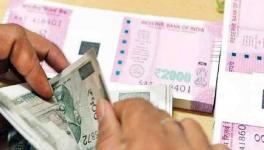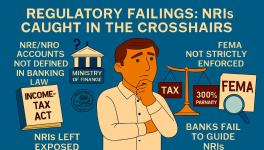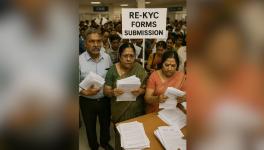COVID-19: Why Modi Govt’s Loan Push Will Not Revive Economy
Like so many policies, the Bharatiya Janata Party-led Narendra Modi government continues to display spectacular folly and anignorance of experience across the world. The government is treating the economic crisis as if it’s a financial crisis, just as it is treating the COVID-19 pandemic more like a law and order issue.
On April 17, the Reserve Bank of India (RBI) announced that it would further lower the interest rate they pay when banks park their unspent money with it. This was being done because, reportedly, in recent days, banks had parked over Rs.6 lakh crore with RBI. After a cut of 25 basis points (0.25%), the interest rate would become only 3.75%. Recall that, just last month, the rate had been cut by a whopping 90 basis points (0.90%).
What does all this mean in plain English? When banks have too much idle money deposited with them, and they find no means of lending it out and earning the usual interest, they park it with the RBI. For this, the RBI pays them an interest, called the reverse repo rate. (As opposed to the repo rate, which is interest rate paid by banks when they borrow from the RBI).
Lowering the reverse repo rate effectively means that the RBI is saying: don’t park this money with us – lend it out to investors. This way, they are encouraging – indeed, hustling – the banks to push more loans out. The thinking is that if loans are given out, the money will be invested in productive activities by wholesome and true-blue industrialists. This, in turn, would mean more employment, more demand and an overall booster shot to the limp economy.
But in real life, this is not how the cookie crumbles. And it requires only school level economics to figure it out – provided you don’t have neo-liberal blinkers on.
Why Is There So Much Idle Money Sloshing Around?
Let’s start all over again, but by asking a different question: why do banks have so much accumulated idle money with them? Why were they falling over themselves to park money in the RBI at a measly interest rate (the reverse repo) of 4% till April 17?
They were doing so because there were no takers for their money. No industrialist worth his or her salt would think of expanding business, investing in plant and machinery, hiring new workers, opening new branches, diversifying or any other standard way of using money in the good old capitalist way, in these times.
As it is, the economy was in a tailspin from before. Bank credit had been declining for several quarters before the COVID-19 pandemic emerged. Industrial output, especially in manufacturing, had been flaccid. Unemployment had hovered at around 7-8% for about a year.
The shadow banking system – non-banking financial companies or NBFCs and micro finance institutions or MFIs – had dropped dead after the IL&FS implosion, thus squeezing the credit line to MSMEs (medium, small and micro enterprises), which account for 30% of the output. NPAs or bad loans went through the roof and the numbers were only being kept in control by writing off an increasing number of non-performing assets. The IBC (Insolvency and Bankruptcy Code) process had been stumbling, huffing and puffing, but to no great advantage except for some cash-rich companies who snapped up the goodies.
Given this pre-COVID scenario, the Modi government had already tried various tricks to “kick-start” the economy, including the unprecedented cut in corporate taxes in September last. It had announced bailout funds for some of the most severe cases, like the construction sector.
Situation Worsens After Pandemic
Yet nothing worked. The economy continued to sink into the swamp. And, it was in this situation that COVID-19 emerged on the horizon. It sucked the oxygen out of the economy, with the Modi government itself contributing to it in large measure by twiddling its thumbs for over 50 days, before coming out with the blunderbuss of the lockdown. This effectively paralysed the entire economy, with workers stranded at homes, migrants scurrying back to their distant home villages, demand slumping like never before, and even supply shriveling up.
In this far worse economic situation than earlier, the Modi government continues to think in the same way as the Bourbon rulers in 19th century France – it was said that after their restoration, they never forgot, they never learnt. They just carried on like ever before.
The RBI thus continues to believe that the idle money piling up in its coffers is only because of some strange idiosyncrasy on the part of bank honchos. “They must be hesitating in giving loans. They are stricken with risk aversion” – so the thinking seems to be, if it can be called thinking at all.
Hence, the cut in reverse repo rate, to supposedly force banks to lend. But, as global experience shows, nowhere is bank credit to industry jumping up in these times. Even in China, a powerhouse economy, GDP has shrunk by over 6% in the last quarter. This when it has already successfully tackled the COVID-19 crisis.
NPAs and then Write Offs
So, nothing is going to come out of this measure of cutting the reverse repo rate. Correction: since, NPA declaration norms have also been eased simultaneously, what will come out of all these shenanigans is that corporate houses may take some loans for splurging on consumption or such other things. This is what various captains of industry were doing with all those bad loans – remember NiravModi and Mehul Choksi et al? If they could do it in those times, imagine what will happen now.
So, ultimately, these bad loans will have to be paid for by the Indian people. That’s what write offs amount to. That’s the collateral damage to Modi government’s fatally flawed policies. No benefit now, but pay the cost later.
Get the latest reports & analysis with people's perspective on Protests, movements & deep analytical videos, discussions of the current affairs in your Telegram app. Subscribe to NewsClick's Telegram channel & get Real-Time updates on stories, as they get published on our website.
























